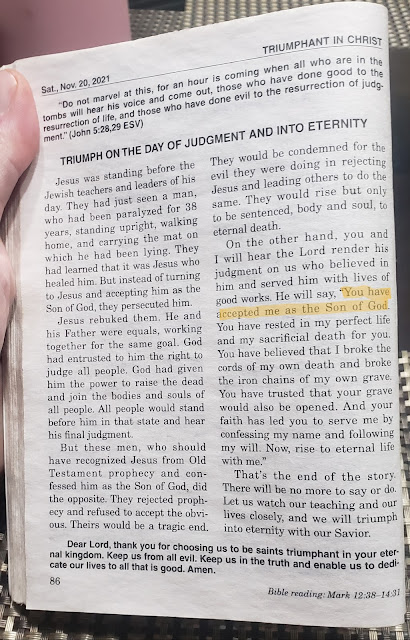Yeah, no, I'm pretty sure He won't be saying that...
WELS' "Meditations" for November 20, 2021
More probable: "Well done, good and faithful servant! Enter into the joy of your Master" (Mt 25:21)
Lenski:
The slave is rewarded beyond all deserts. Being his master’s slave, he and all his labor and skill belonged to that master, thus also all the profits the slave might acquire. But this master is to be a picture of Christ with all his heavenly generosity. The single adverb, “Well!” i.e., “it is well,” is complete in itself, a judgment or a verdict. We might translate, “Fine!” or, “Excellent!” The same is true in regard to δοῦλε ἀγαθὲ καὶ πιστέ, which is an exclamation that is complete in itself. The adverb εὖ is a verdict on the work, the vocative a verdict on the worker, “Slave excellent and reliable!” and thus furnishing his master great satisfaction. No higher commendation can come to any believer from the lips of Jesus. This significant praise outranks all the flattery and the honor the world may bestow. Jesus holds up this commendation to us in advance in order that we may ever keep it before our eyes and allow it to make us always faithful.
This slave’s master might have stopped with this praise, many masters would; or he might have added something tangible, a small sum taken from the profit gained by the five talents. Not so this master who is to be a picture of Jesus: “Over few things wast thou faithful, over many will I station thee.” So all these talents are only “few things,” just enough to try us out to see what kind of slaves we are. What, then, will the “many things” be? They are here veiled by their multitude and their richness, partly because the imagery of the parable is so restricted, and partly also because our poor earthly minds cannot reach up to these coming heavenly glories. But here all the Lord’s goodness and his grace appear: his one thought is our elevation and our joy. He places us first over few things, then over many things, and both of these phrases are placed forward for the sake of emphasis. Note ἐπί in the sense of “over” (R. 604). The future, “I will station thee,” is volitive; it voices the power and the authority of this master. Think of what these words that are addressed to us by Christ imply!
If we have reached the limit of the imagery in the preceding word, we are now taken beyond that limit: “Enter into the joy of thy lord!” It is not strange that in several parables the imagery is too weak to present the full reality that Jesus wishes to convey. So here “the joy of thy lord” is the reality itself, the heavenly joy of Christ himself. “It is but little we can receive here, some drops of joy that enter into us; but there we shall enter into joy as vessels put into a sea of happiness.” Leighton. Gerhard had the same thought: Homo intrat in illud incomprehensibile gaudium.
Lenski, R. C. H. (1961). The Interpretation of St. Matthew’s Gospel (pp. 978–980). Minneapolis, MN: Augsburg Publishing House.

Comments
Post a Comment